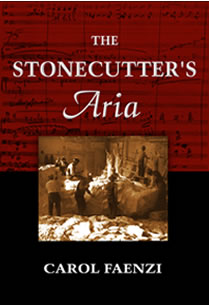Books: The Stonecutter’s Aria

ROME-A heart-warming family saga spanning four generations, Carol Faenzi’s The Stonecutter’s Aria opens up a vista on the Italian immigrant experience in the United States. Her ancestors hailed from Tuscany, on the maternal side Carrara, where the harsh conditions in the marble quarries at the beginning of the twentieth century affected most of the inhabitants. Her great-grandfather Aristide Giovannoni decides to seek a better life in America, but only after a decade-long wait does he succeed in bringing the rest of his family over to join him.
We see his wife, mother and two children at the railway station in Carrara, preparing to leave for Genoa, from where they will board a ship bound for America and a whole new life:
“There were four of us who boarded the train that chilly morning: Nonna Cesira, Mamma, Giorgio and me. The small station in Carrara was not crowded. […] The truth was, not many northern Italians were still leaving for America in 1920.”
The story is told from multiple points of view, and the voice here is that of the author’s grandmother, Olga. It is she who, through a child’s eyes, shows the reader just how tough life was for Italian immigrants in the United States at that time, and even harder for the Afro-Americans, despite having lived there for so long:
“I didn’t understand this new land. I didn’t understand why we couldn’t go to Mass. Mamma just said it was dangerous. I didn’t understand why black people were so hated by whites. I didn’t know what colour we were exactly, only we also were called names when we went into town.”
Olga recounts how the Italians stay together in neighbourhoods, because all of them feel a sense of “surprise – no, shock – over how difficult life in America really is. How keeping our ways and our customs was looked down upon. How bad it felt to be called a dago or a wop.”
These memories are timely for us a century later, when new groups of immigrants still continue to come up against the same kind of prejudice.
Despite the brutality and hardship, Aristide — the stonecutter of the title — explains why he wants to take his son Giorgio to see the Lincoln memorial.
“What is it about that long-dead President that moves me so? I think it must be how simply he said things and how true his words were. […] For myself, being an immigrant, someone who slaved away, sweated alongside black, Italian, Irish and others, I felt the unity in our oppression, but also the knowledge that this country was giving us the opportunity for better lives, for ourselves, yes, but especially for our children. I want my children to have that chance. It’s why I brought them here, and why I teach them, those born here as well, to understand what a great country this is — despite the oppression, despite the hard times. It is all worth it.”
But the author’s experience of America is different again. Carol Faenzi’s mother became a Jehovah’s Witness and despite her parents’ love for her, young Carol’s upbringing was strict. Even celebrating a birthday was considered sinful. She finds the courage to break away from this mortifying environment, but pays a great price: against her wishes, all ties with her immediate family have to be severed. But, with the wise guidance of her loving grandmother Olga, she embarks on a journey, inner and outer, to rediscover her Italian roots.
Faenzi bravely and generously shares this difficult process, offering an inspiring example to anyone who has found themselves in a similar situation. She makes a life-changing trip to Italy, where she says, “The austere had been swiftly replaced with the heady.” The sensuous, joyful reality of Italian life breaks in on her consciousness, opening a heart that has been locked up for too long in fear. She discovers how her grandmother Olga “… seemed to be reminding me of how important it is to remember.” The crux of this uplifting story lies here, when Faenzi herself says:
“I recalled the many times I had looked into faces in faded photographs, asking my grandmother, ‘Who is this?’ The memories were fading like the photos. It haunted me to think that years from now, cousins not yet born would look at old family photographs and wonder who we were.”
It is a basic human need to know who we are and where we come from. As Edmund Burke said, “People will never look forward to posterity who never look backward to their ancestors.” This book is a testament to Burke’s observation: sustained by an affectionate acknowledgement of the strength of the values shown by this family down through the years, generation after generation, it is brought to life by an admiring evocation of the sensuality of so much of Italian daily life, from the sights and smells of mealtimes, freshly laundered bed linen, and home-grown fruit and vegetables. Along with the beauty of those other two pillars of Italian life – art and music – which come together so memorably in The Stonecutter’s Aria.
The Stonecutter’s Aria, Aperto Books 2005, 314 pp. ISBN: 0-9767949-1-8.



